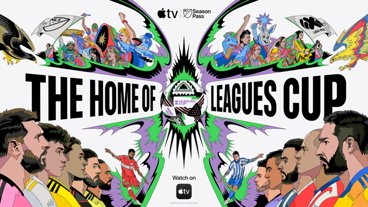Time Warner, NBC Universal delay iPad support in preference to Flash
According to report by the New York Post, unnamed sources reportedly said that "several large media companies, including Time Warner and NBC Universal, told Apple they won't retool their extensive video libraries to accommodate the iPad, arguing that such a reformatting would be expensive and not worth it because Flash dominates the Web."
The media firms are said to be betting on a new fleet of iPad-like devices promised by Dell and HP, which they expect will run Flash and therefore not require any changes to their existing libraries of web content. One media executive also pointed to the announcement of Google TV, which is expected to promote Flash as a media distribution technology, although not to mobile users.
The Flash exodus vs the Flash entrenched
Apple's inability to obtain a functional mobile runtime for Flash from Adobe over the last three years of iPhone OS development has pushed the company to bypass Flash entirely for both interactive content and video delivery, backing the progress of HTML5 for interactivity and H.264 for video delivery instead.
Apple's significant installed base of iPhone devices, representing a valuable affluent demographic of users, have prompted a significant number of companies to abandon Flash as their medium for creating interactive websites. This has included high profile departures by Virgin America, as well as documented scrappings by Scribd.
A report by the Wall Street Journal recently profiled a number of ad agencies, programmers and web designers who say their "clients increasingly are asking that their websites or applications be compatible with Apple's iPhone and iPad."
It cited Carnival Corp. as having remade its cruise line website a year ago without using Flash, just like Virgin America, explicitly because of the iPhone.
Interactivity easy to transition from Flash, video more involved
Condé Nast originally pursued a Flash-centric strategy for developing digital versions of its magazines, including Wired, but was forced to abandon Flash to get its work on iPad. The company attempted to save face by suggesting it had worked with Adobe to convert its Flash application, but in reality had simply written a new native iPhone OS app and reused its existing media content.
Sports Illustrated, which uses Flash extensively on its website, similarly unveiled an HTML5 web app recently; that property is part of Time Warner. The firm's seemingly contradictory stance on Flash is based on the reality that releasing HTML5 or native iPhone OS apps in place of Flash interactive content is relatively easy for publishers to do, while adapting their existing libraries of Flash-encumbered content, such as videos or Flash-wrapped documents, is more challenging and the immediate value of doing this may be less certain.
It's not impossible however, as demonstrated by Google's efforts to deliver YouTube videos to the iPhone, or by similar efforts by Vimeo and Brightcove to make their video content available via H.264. Apple is forging partnerships with Disney to prove that the effort is viable. The iPad's App Store debuted with a custom app from Disney's ABC that delivers content from a variety of the network's shows on demand.
Media companies and end users who continue to bet that Apple's competitors will have an easier time getting Adobe to deliver a functional mobile version of Flash may be disappointed. Hulu, a popular service that uses Flash on the web, intentionally blocks Adobe's Flash Player on mobile devices, but also has plans to release an iPad-compatible version later this year, based on a subscription rather than adware model.
Flash sites that do support the new beta mobile Flash Player don't necessarily work very well; the majority of the existing Flash video content that media firms say they are reluctant to re-encode for delivery using H.264 and HTML5 are not optimized for mobile Flash delivery either. That means the videos' playback will consume far more battery life on mobile devices than it would were they upgraded to modern codecs that can be played by with hardware assistance. So media companies will eventually have to do the work regardless of whether they want to or not.
Big Media vs Apple's iTunes
Apple is not new to media companies dragging feet over entering new markets; the company faced a difficult time pushing music labels to accept standardized pricing and per-song sales in iTunes. In 2007, Universal threatened to end its music contract with iTunes, and subsequently began selling its music as MP3s to competing stores such as Amazon while refusing to support DRM-free sales in iTunes, hoping to gain more negotiating leverage with Apple over increasing song prices.
Apple entered episodic TV sales with only one major partner: Disney, which Apple's chief executive Steve Jobs had the leverage to convince to enter the new direct TV sales market. Other TV networks were reluctant to join iTunes until Apple could prove the new model would work.
Even after all the major networks had signed on, NBC Universal split from iTunes for a year in late 2007 over a feud involving content pricing. NBC came back the next fall after its solo efforts with "NBC Direct" failed to materialize.
Apple also faced difficult negotiations with movie studios over digital rentals and HD content, but in 2008 entered the market with movies from every major studio, with HD content becoming available the next year. Other efforts Apple had tried to introduce, including a cloud-based iTunes Replay service Apple has had in negotiations with the labels and studios for nearly a year and a half, have still not yet emerged.
 Prince McLean
Prince McLean













 Amber Neely
Amber Neely
 Thomas Sibilly
Thomas Sibilly
 AppleInsider Staff
AppleInsider Staff
 William Gallagher
William Gallagher
 Malcolm Owen
Malcolm Owen
 Christine McKee
Christine McKee










159 Comments
Stupid, stupid, stupid old media companies. Will you ever learn???
D'oh!
Just curious. What format is/are used in the existing iTunes database of movies, tv programs and other videos?
It does cost a lot of money, and many new programmer/developers with the correct expertise and experience to hire. The movie and TV industries are reeling from the impact of the latest and still lingering economic downturn. Even the bankable stars supposedly have to endure drastic cuts in their pay scale. No more 10-40 million dollars for leading stars.
Calculate how many hundreds or millions of movies, TV programs must be rented/sold digitally to recoup the investments, especially when the banks are not lending money. There are no rich Arabs or Asians either to splurge their oil money or Bollywood extra cash, this time around.
Unless Steve Jobs/Apple or you perhaps you, shell out the funds, it may not be too simple or even prudent to make judgement, as you uttered.CGC
... According to report by the New York Post, unnamed sources reportedly said that "several large media companies, including Time Warner and NBC Universal, told Apple they won't retool their extensive video libraries to accommodate the iPad, arguing that such a reformatting would be expensive and not worth it because Flash dominates the Web."
The media firms are said to be betting on a new fleet of iPad-like devices promised by Dell and HP, which they expect will run Flash and therefore not require any changes to their existing libraries of web content. One media executive also pointed to the announcement of Google TV, which is expected to promote Flash as a media distribution technology, although not to mobile users. ...
Especially from that last sentence quoted above, it's clear that the execs at these companies have no idea what they are doing. And good luck with that "fleet of iPad-like devices promised by Dell and HP."
Well, when they start to realize the impact it's having on their bottom line, I expect they'll change their plans quickly. But, there are always casualties in technology transitions, especially among the laggards.
They have every right to stick to their guns. If Apple wants to push forward with HTML5, that's their choice as well.
To be honest, I'd rather have the choice on my device of which platform I wanted to use instead of someone forcing me one way or the other. HTML5 isn't ready to take over 98% (or whatever number Adobe is throwing around these days), so until that does happen, I'll have to side with the NBC/Time Warner guys.
Besides, how long would it take to retool a site like Hulu anyway? That can't be a simple task.